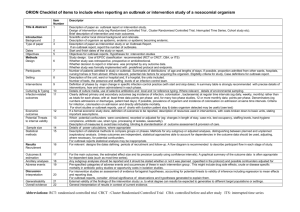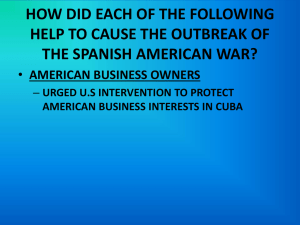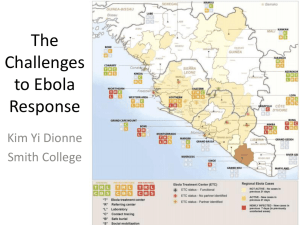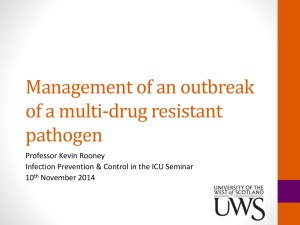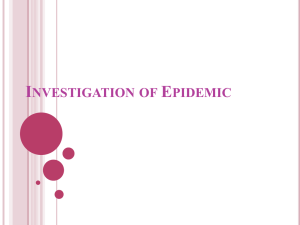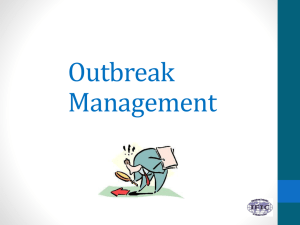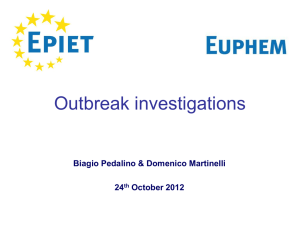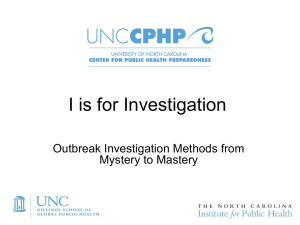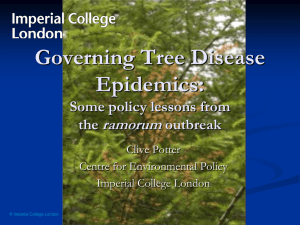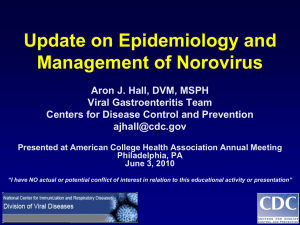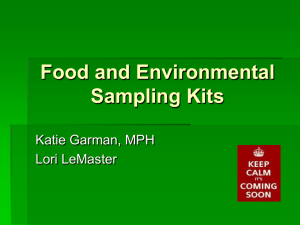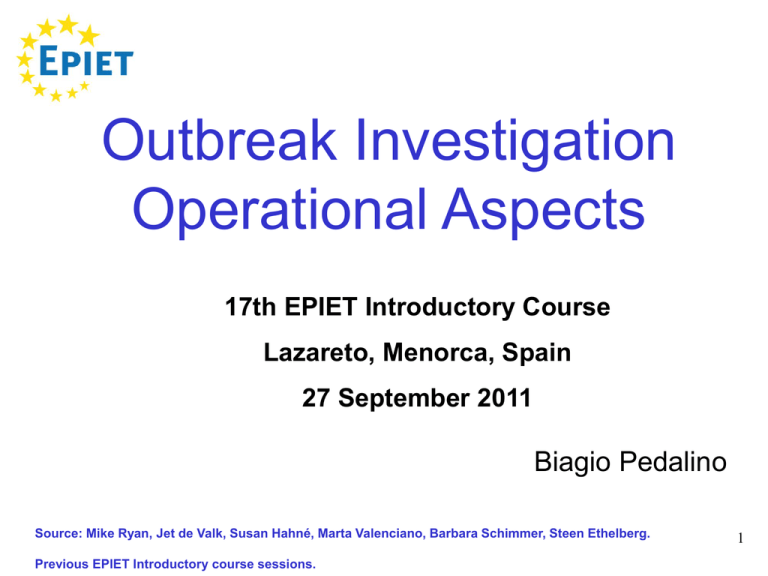
Outbreak Investigation
Operational Aspects
17th EPIET Introductory Course
Lazareto, Menorca, Spain
27 September 2011
Biagio Pedalino
Source: Mike Ryan, Jet de Valk, Susan Hahné, Marta Valenciano, Barbara Schimmer, Steen Ethelberg.
Previous EPIET Introductory course sessions.
1
Objectives
• The organizational challenges in outbreak
investigations
• Preparing and organizing yourself for field
work
• Systematic approach to operational
aspects
2
Intervention epidemiology
Definition
• The timely use of epidemiology to solve
urgent public health problems
Objective
• To maximise the scientific quality of the
investigation in a complex environment
3
What is an outbreak ?
• Occurrence of more cases of disease
than expected
– over a particular period of time
– in a given area
– among a specific group of people
• Same disease, same source
4
Why investigate outbreaks
• Stop the outbreak
• Learn, so that it doesn’t happen again
or that you’ll catch it earlier next time
5
Outbreak Detection and Response
First
Case
Detection/
Reporting
Lab
Confirmation Response
DAY
40
37
34
31
28
25
22
19
16
13
10
7
Opportunity
for control
4
1
90
80
70
60
CASES 50
40
30
20
10
0
6
Outbreak Detection and Response
First
Detection/
CaseConfirmation
Reporting
Investigation
Response
Opportunity
for control
40
37
34
31
28
25
22
19
16
13
10
7
4
1
90
80
70
60
CASES 50
40
30
20
10
0
7
DAY
Early detection and response
1993 Western States E. coli O157 Outbreak
70
726 ill, 4 deaths
Number of Cases
60
50
40
30
39 d
20
10
0
1
8
15
22
29
36
43
50
57
64
71
Day of Outbreak
2002 Colorado E. coli O157 Outbreak
70
Number of Cases
60
44 ill, no deaths
50
40
30
18 d
20
10
0
1
8
15
22
29
36
43
Day of Outbreak
50
57
64
71
8
Epidemiological
• Confirm outbreak
• Case definition
• Case finding
• Descriptive epi
• Form hypothesis
– Interviews
– Review info
• Test hypothesis
Operational
• Inform of outbreak
• Outbreak team
– Form
– Lead
– Cooperation
• Communication internally and
with partners
• Communication with the press
• Organisation of your work
• Dissolve team, report etc.
9
Scenarios
Local Outbreak
- local authorities coordinate
- you are asked to assist / help
National Outbreak
- your institute coordinates
- you are asked to lead / cooperate
International /
European outbreak
involving your
country
Outbreak in another
country
- ECDC / WHO coordinates
- your institute collaborates
- you participate
- the authorities in that country
coordinate
- you are asked to assist
10
Possible involvement of a field epidemiologist
(before, during or after the EPIET fellowship time)
Local Outbreak
- local authorities coordinate
- E Coli in Dublin, 2003
- you are asked to assist /
help
National
Outbreak
- your institute coordinates
- Dried tomatoes
- you are asked to lead /
cooperate
in France, 2009
International /
European
outbreak
involving your
country
- ECDC / WHO coordinates
-Norovirus among
holidaymakers, 2002
Outbreak in
another country
- the authorities in that
country coordinate
-Ebola, Uganda(2000),
DRC(2007)
- you are asked to assist
-Hepatitis E, Chad (2007)
- your institute collaborates
- you participate
-Pandemic influenza 2009
-Cholera, Uganda (2005)
11
Operational challenges
• Unexpected event
• Need to investigate quickly
• Pressure for answers
• Multiple agencies/actors
• Work carried out at many levels
• You may be in the media spotlight
• Possible legal implications
12
Cooperation/coordination is crucial
Clinicians
Epidemiologist(s)
Diagnostic labs
Public health authorities
Food authorities
OTHERS:
Disease specialists
Environmentalists
Veterinarians
Engineers
Media people
13
Challenges, Outbreak Team
• Different institutes, ministries
• Different backgrounds, fields
• Different cultures, scientific languages
• Different expectations
• Don’t know/trust each other
• Someone has to decide over the others
• Working under time pressure
• Outbreaks hit suddenly, little time to prepare
14
Organisational hints/solutions
• Clear and transparent leadership
• Build trust before the outbreak happens
– Meetings in peace time
• Preparedness plan, guidelines
• Adjust expectations, clarify roles
• Support from strategic level
– Administrative support
– Help with communication
• Efficient information sharing, everyone same picture of situation
• Standard operating procedures, templates
• Possibility of going to “crisis mode”
15
Emergency management
1
INITIATION
LOGISTICS
CRISIS
MODE
5
Collecting info
Organising info
HANDLING
INFORMATION Sharing info
Making sure everyone
has info needed
Documentation
2
3
COORDINATION
ACTION
Doing the epi work, e.g.:
Case finding, interviews,
collecting specimens, etc.
Start crisis management
Meetings, minutes
Place to work, food
4
CRISIS
COMMUNICATION
Strategy for activities
Prioritising
Deciding spec. tasks
Who should do what
External communication
Press strategy/plan
Media communication
16
Challenges in the field
• You may arrive late
• Understand local expertise/hierarchies
• Local sensitivities
• Foreign country (i.e. language, culture)
• Need to feedback to various people
• Many actors involved
• Stress, long working hours…
17
… find some time to RELAX!!!
18
Investigation
Toxic
products
Surveillance
Dead
Exposed
Prediction
Clinicians
Epidemiology
Psychol
ogical
support
unit
Co-ordination
Parents
Students
Principal
Teachers
Sick
Laboratory :
clinical
environmental
Environmental
health
General
population
Clinical
Specimen
transfer
Diagnostic
Media
Authorities
Autopsy
Decisions
Police, legal authorities
School closure
Medical
examinations19
Systematic approach
Systematic approach
• Reasons for inviting you
– ´Terms of reference´ ?
• Preparing to leave for the field
• When you arrive
• In the field
– Outbreak Control Team
– Information management
– Leaving the field
• Back home
20
Reasons for inviting you
• Expertise
• More resources
• Share responsibility
• Political or mass media pressure
• Mandatory or in guidelines
• Need to confirm local findings
• Specialised investigations
21
Waterborne outbreak
Denmark 2007
• 15 Jan SSI contacted by district medical
officer
• Much GI illness in town in Zealand
• Water suspected, OCT forms
• SSI invited to participate
– Epi expertise
– Lab assistance
– Resources
22
Terms of reference
Clarify before accepting
• What are their expectations
– expertise, tasks, time?
– what local resources are available?
• What has already been done?
• What resources do you need to bring?
• What is your role?
• Who is in charge?
23
Preparing to leave
• Consult colleagues (microbiologist, veterinarians, GP,
internal medicine specialist….)
• Review relevant literature, guidelines
• Decide who will lead the team
• Identify who provides support in head office
• One page report before leaving
– objectives
• Arrange initial meeting for your arrival
• Discuss with your colleagues (and your boss) at the
institute to organise follow up of your ongoing projects!
24
Bring your ”epi-pack”
• Laptop
– Software (e.g. epidata, stata)
– File templates
– Standard questionnaires
•
•
•
•
•
•
•
•
Mobile phone, calculator
Notebook (log)
Guidelines, handbooks, articles
Camera
Phone numbers, address lists
Maps (GPS)
Sometimes: Laboratory equipment
Others... (money, ”health kit”,)
25
When you arrive
• Provide help - don’t take charge
• Meet with key people
• Review and update status of problem
• Assess sensitivities
• Identify local resources and skills
• Set up communications with base
26
Outbreak team
•
•
•
•
•
•
•
•
•
•
•
Municipality technical manager (leader)
People from various townhall offices
Medical officers
Water plant
Water supply system
Police
Emergency Management Agency
Food safety
SSI
Private engineering company
Media relations officer
27
The Outbreak Control Centre
• Situation room / designated office
• Where, how big
• Accessibility / Security
• Computers with Internet connection, network and
firewall problems
• Telephones, fax, copy machine
• Reference materials
• Catering
• Place to sleep
28
Organizing the outbreak control team
• Membership
• Leadership
• Responsibilities
• Lines of communication (how)
• Communication (who)
• Decision making process
29
Information / Data
• Types of information
– epidemiological
– operational
• Ways of communicating: emails,
briefings, meetings, ftp/google/dropbox…
• Managing information (databases)
• Communicating with the media: one
person!
• Writing reports: ongoing process
30
Epidemiological data
• Line listing is vital
– cases/contacts
– lab results, questionnaires available
– in excel
• Constitutes and updates a database
of cases
• Protects the confidentiality of the
patients
• Prepares an easy, automated,
descriptive analysis
31
The line list
• Only one in the team!!!
– avoid confusion with multiple versions
• Contains a unique identifier for each record
(case)
• Ensures confidentiality
• Contains essential information on each case
– time, place, person, other (e.g., clinical, lab)
• Can be updated as the investigation develops
• Allows regular, automated, computerized
analysis
32
Typical line listing for
an outbreak investigation
Unique
identifier
Time
Place
Person
Outcome
Lab
Uni. ID
1
2
3
4
OnsetDate Ward
Block
1-Mar-05
18
3-Mar-05
22
5-Mar-05
23
6-Mar-05 -
City
2 HYD
1 HYD
3 HYD
SEC
AgeYears Sex
12
25
36
23
1
2
1
2
Hospital Death
HEVIgM HAVIgM
1
2
1
9
1
2
2
1
2
9
9
9
1
1
1
2
33
Situation report
• Overview of the current situation
• Concise, focus on facts
• Structured, may use template
– No cases, epicurve, map, what has been done
• Paragraph with development since last
report
• May contain risk assessment
• May contain scenarios, predictions
34
Operational information
• Contacts: name, position, contact details
• Types of files
– epidemiological (questionnaires, data, protocols)
– interviews, meetings, press
– emails
• Meetings
– minutes
– actions and those responsible
• Decisions and rationale
(information available at the time of decision making)
• All steps taken in the investigation
35
Organising data
• Laptop, network, web?
• Backups / confidentiality / access
• Selfexplanatory files and folders
• Sometimes professional data manager
• Inventory of files
• Log book!
– every day
36
The Media
• Appoint one (professional) spokesperson
– prepare briefings for him / her
• Coordinate with other agencies
• Inform early and often
–
–
–
–
websites of relevant institutes
interviews
press statements
press meetings
• Be honest, explain what is being done
• Be clear about what is
– fact / speculation / not known
37
Leaving the field
• Debriefing meeting
• Preliminary report
• Commit to produce final report
• Archive data
38
Back home
• Inform your supervisor and colleagues
– debriefing
• Follow up
– lab, clinical other studies results
– Stay in touch with the field - new cases
• Finalise the report ASAP
• Beware of confidentiality
– anonymise database
– anonymise questionnaires
39
Summary
•
•
•
•
•
•
•
•
•
Outbreak investigations are challenging
Each outbreak investigation is different
Cooperation is difficult, requires organisation
Preparation and good operational skills help
Offer help, do not take charge
Stay organised
Don´t come back until the job is done
Document steps, use a log, write the reports
Take time to rest, and remember to have fun!
40
Thanks for your attention !!!
Questions ???
41

